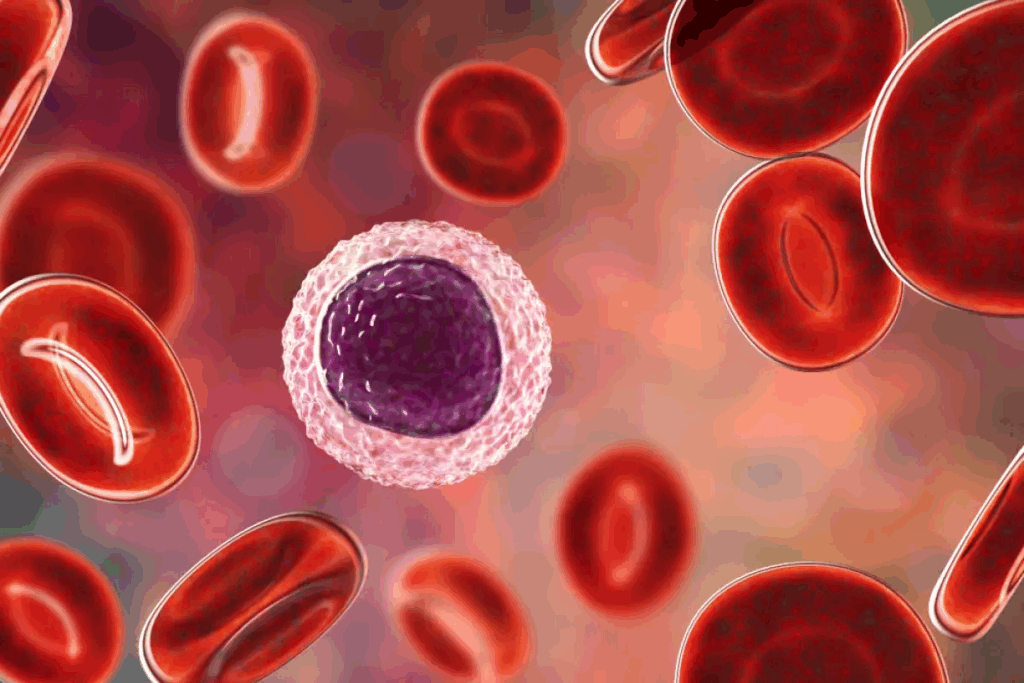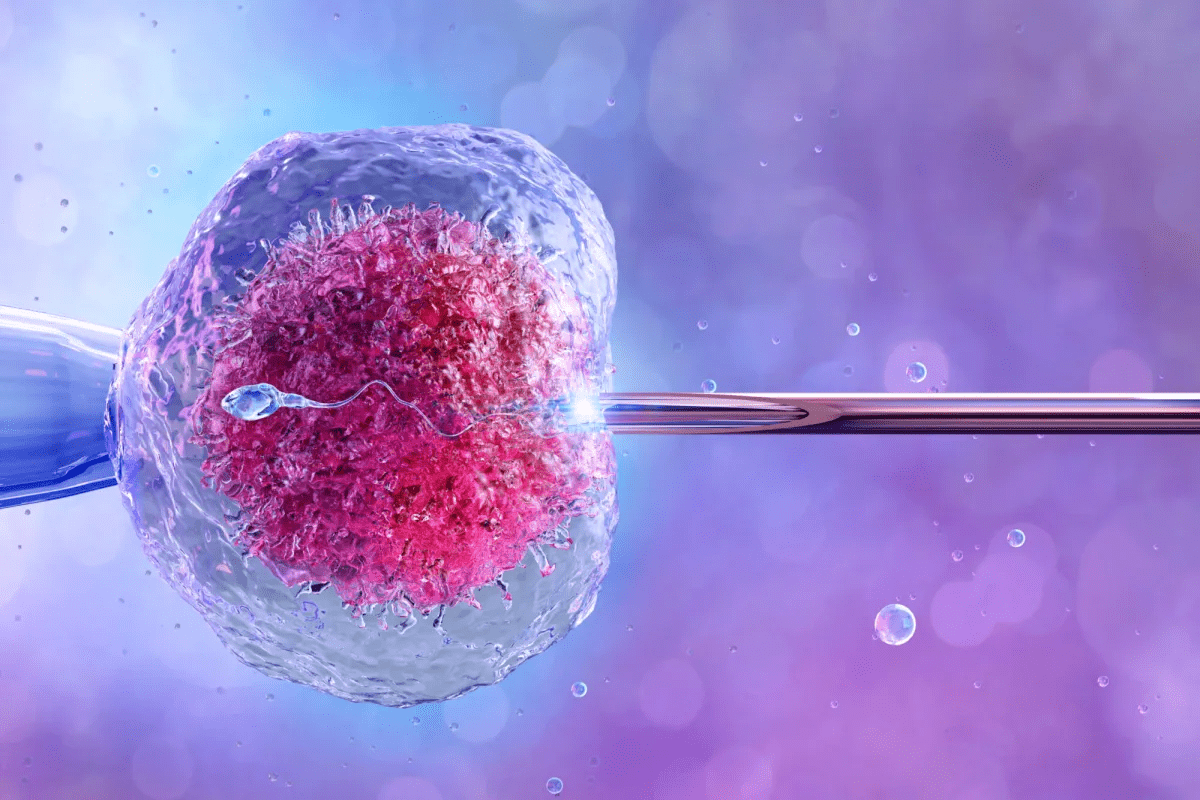
Spotting the early signs of blood cancer can save lives. At Liv Hospital, we stress the need to know the small symptoms that are often missed.Learn blood cancer symptoms and early warning signs adults and women should watch for prompt detection.
Symptoms of blood cancer can be hard to spot. This is why adults and women need to keep an eye on their health. Signs like constant tiredness, sudden weight loss, and odd bruises are red flags.
We focus on our patients, giving them top-notch care with the newest methods. Knowing the early signs helps people get help fast. This can lead to better health outcomes.
Key Takeaways
- Early detection of blood cancer symptoms is key to quick action.
- Look out for signs like constant tiredness, sudden weight loss, and odd bruises.
- Being alert and aware is essential to catch these subtle symptoms.
- Liv Hospital offers a patient-focused approach with expert care.
- We use the latest methods to provide thorough treatment.
Understanding Blood Cancer: Types and Prevalence

Blood cancer is a group of diseases that affect the blood, bone marrow, and lymphatic system. It disrupts the normal production of blood cells, causing health problems. We will look at the different types of blood cancer and how common they are.
What is Blood Cancer?
Blood cancer happens when blood cells are made abnormally. This can lead to too many bad cells in the bone marrow. There are many types of leukemia. Some are more common in kids, while others mostly affect adults.
Common Types: Leukemia, Lymphoma, and Myeloma
The main types of blood cancer are leukemia, lymphoma, and myeloma. Leukemia is when white blood cells grow abnormally. Lymphoma affects the lymphatic system, helping fight infections. Myeloma, or multiple myeloma, is cancer of plasma cells in the bone marrow.
Each type has its own symptoms and risk factors. Leukemia can cause fatigue, weight loss, and frequent infections. Lymphoma may lead to swollen lymph nodes, fever, and night sweats. Myeloma can cause bone pain, anemia, and an increased risk of infections.
Who is at Risk?
Knowing who is at risk for blood cancer is key for early detection and prevention. Risk factors include genetic predisposition, exposure to certain chemicals, and previous radiation therapy. Age is also a big factor, as the risk of certain blood cancers increases with age.
For example, myeloma is more common in older adults. Some leukemia types are more common in children.
We need to know the signs and symptoms of blood cancer for early diagnosis and treatment. By understanding the types and prevalence of blood cancer, we can better appreciate the importance of awareness and proactive health measures.
Why Early Detection of Blood Cancer Symptoms Matters

Finding blood cancer symptoms early is key to better treatment and survival. Early detection is critical for managing and treating blood cancer well.
Impact on Treatment Success
Spotting blood cancer early boosts treatment success. The American Cancer Society says early cancer detection leads to better treatment. For blood cancer, early diagnosis means quicker action, which helps patients more.
The benefits of early detection include:
- More effective treatment options
- Improved survival rates
- Better quality of life during treatment
For example, someone with leukemia caught early might have a better chance than one diagnosed later. The table below shows how survival rates change with early diagnosis.
| Stage at Diagnosis | 5-Year Survival Rate |
| Early Stage | 65% |
| Late Stage | 35% |
Challenges in Early Diagnosis
Early detection of blood cancer faces several hurdles. These include:
- Non-specific symptoms that can be mistaken for other conditions
- Lack of awareness about blood cancer symptoms among the general public
- Limited access to healthcare services in some regions
It’s vital for healthcare providers to be alert and for patients to know the symptoms of blood cancer. By understanding these challenges, we can aim to improve early detection and diagnosis.
Unexplained Fatigue and Weakness
Persistent tiredness is a big warning sign, often linked to blood cancer. Many patients say they feel extremely tired, even when they’re not doing much. This isn’t just regular tiredness.
Fatigue from blood cancer is not like being tired after a long day. It’s a deep, lasting exhaustion that doesn’t get better with rest.
How Blood Cancer Causes Fatigue
Blood cancer can make you tired in several ways. One main reason is anemia, when you don’t have enough red blood cells or hemoglobin. This means your body’s tissues don’t get enough oxygen, making you weak and tired.
Another reason is the production of cytokines, proteins made in response to cancer. These cytokines can mess with how your body uses energy, making you feel very exhausted.
Distinguishing Cancer-Related Fatigue from Normal Tiredness
How do you tell if you’re just tired or if it’s cancer-related fatigue? Look at how long and how bad the tiredness is. If you’re tired all the time, even after resting, and it’s affecting your daily life, talk to your doctor.
If you also have other symptoms like weight loss, fever, or night sweats, get medical help. Knowing why you’re tired is key to getting the right treatment.
Frequent Infections and Fever That Won’t Subside
When you keep getting infections and can’t shake a fever, it might mean your immune system is weak. This could be a sign of blood cancer. We’ll look at how your immune system and blood cancer are connected. We’ll also talk about the signs you shouldn’t ignore.
The Connection Between Immune Function and Blood Cancer
Blood cancer, like leukemia, lymphoma, and myeloma, can weaken your immune system. People with leukemia often get sick more easily. This is because blood cancer messes with how white blood cells work. White blood cells fight off infections.
The link between your immune system and blood cancer is complex. A strong immune system can fight cancer. But, if blood cancer weakens your immune system, you’re more likely to get sick.
Key factors in this relationship include:
- The type and stage of blood cancer
- The extent of immune system impairment
- The body’s ability to respond to infections
Warning Signs of Compromised Immunity
It’s important to know the signs of a weak immune system. This can help catch blood cancer early. Some signs to watch for are:
- Recurring infections that are hard to treat
- Prolonged fevers without a clear cause
- Unexplained fatigue and weakness
Remember, these symptoms can mean different things. They might not always be blood cancer. So, seeing a doctor is key to finding out what’s really going on.
“Early detection of blood cancer significantly improves treatment outcomes. Being aware of the signs and symptoms can lead to timely medical intervention.”
Understanding the connection between infections, fever, and blood cancer can help you stay healthy. If you keep getting sick and can’t shake a fever, talk to a doctor. They can check you out and run tests if needed.
Unexplained Weight Loss and Appetite Changes
Patients with certain blood cancers often notice changes in appetite and unexplained weight loss. These symptoms can be scary and might signal a serious health problem. We’ll look into how blood cancer impacts metabolism and appetite, causing weight loss. We’ll also talk about when such weight loss should worry you.
Metabolic Changes in Blood Cancer
Blood cancer can change how your body uses energy. It might make your body burn more calories. It can also mess with hormones that control hunger and energy use.
Some key changes include:
- Increased resting energy expenditure
- Alterations in glucose and lipid metabolism
- Changes in hormone levels, such as insulin and cortisol
When Weight Loss Becomes Concerning
While losing a bit of weight is normal, losing a lot without reason is a warning sign. We should worry if you lose more than 5% of your body weight in a month. Also, if you’re tired, have a fever, or find it hard to do daily tasks.
Look out for signs like:
- Loss of appetite
- Changes in taste or smell
- Difficulty swallowing
- Feeling full quickly
If you’re experiencing these symptoms, seeing a doctor is key. They can find out why and help you get better.
Night Sweats and Temperature Fluctuations
Blood cancer can show itself in many ways, like night sweats and changes in body temperature. These symptoms can really upset your daily life. It’s important to know how they link to blood cancer.
Night sweats are when you sweat a lot while you’re sleeping. People with blood cancers like leukemia often get them. Night sweats are a common sign of leukemia. It’s because the body is fighting the cancer with inflammation.
The Inflammatory Response in Blood Cancer
The body’s fight against cancer, including blood cancer, involves inflammation. As cancer grows, it can cause inflammation. This leads to symptoms like fever and night sweats. The body is trying to fight the cancer, but it can also cause discomfort.
In blood cancer, the inflammation can be strong. It can cause noticeable symptoms. For example, certain proteins can make you feel feverish and have other symptoms.
Patterns to Watch For
It’s important to notice the patterns of night sweats and temperature changes. Do they happen with other symptoms like losing weight or feeling tired? Are the temperature changes constant or do they come and go? Knowing these patterns helps doctors make better diagnoses.
Some important patterns to look out for include:
- How often and how long you sweat at night
- How severe the temperature changes are
- If you have other symptoms like being tired, losing weight, or changes in your skin
By paying attention to these details and talking to a doctor, you can get a better check-up. If needed, you can start treatment for blood cancer sooner.
Easy Bruising and Abnormal Bleeding: Key Blood Cancer Symptoms
Easy bruising and abnormal bleeding are key signs of blood cancer. They happen because the disease affects platelet counts and blood health. These symptoms mean your platelet count might be low or your platelets aren’t working right.
The Role of Platelets
Platelets are vital for our blood. They help stop bleeding when we get hurt. But, blood cancer can mess with platelet production. This leads to thrombocytopenia, or low platelet count. So, you might bruise easily and bleed more than usual.
Common Sites of Unusual Bleeding
Unusual bleeding can happen in many places. This includes the gums, nose, and stomach. Women might also see heavy or long menstrual bleeding. Seeing these signs means you should talk to a doctor.
Heavy Menstrual Bleeding in Women
Heavy menstrual bleeding is a big worry for women. While menstrual flow can change, menorrhagia (heavy bleeding) is a red flag. If your period is much heavier than usual or disrupts your life, see a doctor.
Knowing about easy bruising, abnormal bleeding, and blood cancer can help catch it early. If you’re showing these signs, talk to a healthcare expert right away.
Swollen Lymph Nodes and Enlarged Spleen or Liver
Blood cancer can show itself in many ways. Swollen lymph nodes and an enlarged spleen or liver are key signs to watch. They suggest something might be wrong with our body’s lymphatic system or organs.
Locations to Check for Swelling
Swollen lymph nodes can show up in the neck, armpits, and groin. It’s important to notice any swelling in these spots. Lymph nodes filter out bad stuff and grow when there’s a problem.
When Swelling Indicates Possible Blood Cancer
Swollen lymph nodes, an enlarged liver or spleen, can mean leukemia. This is a blood cancer. If you see swelling or enlargement that won’t go away, see a doctor. They can check your health and run tests to find out why.
An enlarged spleen or liver might feel like a lump or discomfort in the belly. This could mean blood cancer or other health problems. If you notice anything odd, get medical help.
Knowing the signs of blood cancer, like swollen lymph nodes and an enlarged spleen or liver, is key. If you notice any changes, talk to a healthcare professional right away.
Bone and Joint Pain
Bone pain is a symptom of leukemia, a blood cancer. It happens when cancer cells build up in bones. This makes bones tender and uncomfortable.
The Impact of Blood Cancer on Bones
Blood cancers like leukemia, lymphoma, and myeloma can harm bones. Cancer cells in the bone marrow cause pain and weaken bones. Bone pain is a sign of leukemia. It’s because cancer cells gather in bones. This makes bones hurt or feel tender.
Distinguishing Cancer Pain from Other Causes
Telling if bone pain comes from blood cancer or something else is hard. But, some signs point to a serious problem.
| Characteristics | Blood Cancer-Related Pain | Other Causes |
| Duration | Often persistent or recurring | May be temporary or related to activity |
| Intensity | Can be severe and debilitating | Varies, often related to movement or strain |
| Associated Symptoms | Often accompanied by fatigue, weight loss, or fever | May be isolated or related to injury |
Knowing the difference is key for early treatment. If you have ongoing or severe bone pain, see a doctor. This is true if you also feel tired or lose weight without reason.
Skin Changes and Abnormalities
Skin changes can be signs of blood cancer. This includes leukemia, lymphoma, and myeloma. These diseases affect blood cells and platelets, leading to skin issues.
Rashes and Discoloration
Rashes and skin discoloration might signal blood cancer. These can look like red or purple spots. They might itch or hurt.
The link between blood cancer and rashes is often due to cancer cells in the skin. Or it could be the body’s reaction to the cancer.
Petechiae and Purpura
Petechiae are small red or purple spots from bleeding in small blood vessels. Purpura is larger bruising or discoloration. Petechiae often show up in leukemia. These signs usually come from low platelet counts. This happens when cancer cells affect the bone marrow.
How Symptoms Appear on Different Skin Tones
Skin changes look different on various skin tones. For instance, petechiae might be easier to see on lighter skin. On darker skin, they could look like darker spots or patches.
Knowing these differences is key for catching symptoms early. It helps in getting a proper diagnosis.
Unique Blood Cancer Symptoms in Women
Blood cancer in women can show different symptoms than in men. Some symptoms are common, but women may have unique ones. These can be more noticeable because of their body’s differences.
Hormonal Impacts and Menstrual Changes
Blood cancer can affect women’s hormones and menstrual cycles. Heavy menstrual bleeding is a common symptom. It happens because of low platelet counts in leukemia and other cancers.
This symptom can be very uncomfortable. It may also lead to anemia, a condition where the body lacks enough red blood cells.
Changes in menstrual patterns can have many causes. But, if they are severe or last a long time, it’s important to check why. Women with unusually heavy or prolonged menstrual bleeding should see a doctor. It could be a sign of blood cancer.
Pregnancy Complications
Blood cancer can also affect pregnancy. It can cause severe anemia, infection, and bleeding in both the mother and the baby. Pregnant women or those planning to get pregnant should talk to their doctor about their health.
Pregnancy complications are a worry for many women. While blood cancer is rare during pregnancy, knowing the risks helps. Regular health checks are key to early detection and treatment.
Distinguishing from Other Women’s Health Issues
It’s hard to tell if a woman has blood cancer because its symptoms can look like other health problems. Symptoms like heavy menstrual bleeding or hormonal changes can be from conditions like fibroids or PCOS. So, if symptoms don’t go away or get worse, a full medical check-up is needed.
Getting a detailed medical check-up is important to find out what’s causing symptoms. Doctors might do blood tests, bone marrow biopsies, or imaging studies. These tests help figure out if blood cancer is present.
Shortness of Breath and Chest Discomfort
When you feel short of breath or have chest discomfort, it’s important to think about blood cancer. These signs might mean you need to see a doctor.
Anemia’s Effect on Breathing
Anemia means you don’t have enough red blood cells or hemoglobin. This makes it hard for your body to get enough oxygen. Anemia can make you breathe faster, which is common in leukemia patients.
Key effects of anemia on breathing include:
- Increased respiratory rate
- Reduced oxygen-carrying capacity
- Potential for heart strain due to increased cardiac workload
When to Be Concerned About Respiratory Symptoms
It’s important to watch how long and how bad your breathing symptoms are. If you have constant or severe shortness of breath and chest pain, you should see a doctor. These signs can mean you have blood cancer, even in its later stages.
| Symptom | Possible Indication | Action |
| Mild shortness of breath | Early sign of anemia or other conditions | Monitor and consult a doctor if persists |
| Severe shortness of breath | Advanced anemia or serious cardiac issues | Seek immediate medical attention |
| Chest discomfort | Potential cardiac strain or other serious conditions | Consult a healthcare professional promptly |
Knowing what shortness of breath and chest discomfort mean can help you get medical help fast. This might lead to finding and treating blood cancer sooner.
Persistent Abdominal Discomfort
Abdominal pain or discomfort that doesn’t go away can signal blood cancer. We’ll look into how this symptom shows up and what it might mean.
Organ Enlargement and Digestive Symptoms
Blood cancer, like leukemia, can make organs like the spleen or liver grow bigger. This can cause belly pain. The enlargement of these organs can also put pressure on the stomach and other digestive parts, leading to digestive issues. Symptoms can include feeling full fast, nausea, or less hunger. It’s key to know these signs can also show up in other health problems.
Differentiating from Common Digestive Issues
Telling apart belly pain from blood cancer and common digestive problems is hard. Issues like irritable bowel syndrome (IBS), gastritis, or gastroenteritis can have similar signs.
But, if you have persistent and severe belly pain with other signs like unexplained weight loss, fever, or tiredness, see a doctor. Catching blood cancer early can greatly help treatment.
Stay alert to any unusual or ongoing symptoms. If you notice anything odd, talk to a healthcare expert.
When to See a Doctor: Taking Action on Blood Cancer Warning Signs
Knowing when to see a doctor is key to catching blood cancer early. It’s not always easy to spot the signs, but knowing them is the first step to health.
Urgent Symptoms That Shouldn’t Wait
Some symptoms need quick medical attention. If you notice any of these, get help right away:
- Severe fatigue that makes it hard to do daily tasks
- Unexplained bleeding or bruising
- Frequent infections or fever that won’t go away
- Significant weight loss without a clear reason
- Swollen lymph nodes, spleen, or liver
These signs can mean serious health issues, like blood cancer. If symptoms are persistent or severe, see a doctor.
What to Expect During Evaluation
At your doctor’s office, they’ll start with a detailed medical history and physical check-up. They might also run tests, such as:
- Blood tests to check for abnormal blood cell counts
- Imaging tests like X-rays, CT scans, or MRI scans
- Bone marrow biopsy to examine the bone marrow for cancer cells
These tests help find the cause of your symptoms and decide the best treatment.
Preparing for Your Appointment
To get the most from your doctor’s visit, prepare well. Here’s how:
- Write down your symptoms, including when they started and how long they’ve lasted
- List any medications you’re currently taking
- Bring any relevant medical records or test results
- Prepare a list of questions to ask your doctor
Being ready will help you have a useful talk with your doctor and get the info you need.
Conclusion: Empowering Yourself Through Awareness
Knowing the symptoms of blood cancer is key for early detection and treatment. By recognizing signs like unexplained fatigue, frequent infections, and easy bruising, you can act early. This proactive approach is vital for your health.
Doctors stresses the need to know the signs of leukemia and seek medical help if they don’t go away. We urge you to learn about blood cancer and how it affects you. Knowledge is your strongest ally in fighting this disease.
Stay informed about blood cancer symptoms and talk openly with your doctor. This way, you can get help quickly and possibly improve your treatment results. We’re here to support you with all the care and guidance you need.
FAQ
What are the common symptoms of blood cancer?
Common symptoms include unexplained fatigue, frequent infections, fever, and unexplained weight loss. Night sweats, easy bruising, and abnormal bleeding are also signs.
How does blood cancer cause fatigue?
Blood cancer affects the production of healthy blood cells. This leads to anemia. Anemia makes it hard for the body to get oxygen to tissues and organs.
What is the connection between blood cancer and frequent infections?
Blood cancer weakens the immune system. It does this by reducing healthy white blood cells. This makes it harder for the body to fight off infections.
Are there specific blood cancer symptoms in women?
Yes, women may experience heavy menstrual bleeding and hormonal changes. Pregnancy complications are also possible. These symptoms are different from other women’s health issues.
How can I distinguish blood cancer symptoms from other conditions?
If you have persistent or severe symptoms, see a doctor. They will check your health, medical history, and do tests to find the cause.
What are the signs of blood cancer on the skin?
Skin changes include rashes, discoloration, and small red or purple spots. Larger purple areas can also appear. These symptoms look different on different skin tones.
Can blood cancer cause bone and joint pain?
Yes, it can. Blood cancer can cause pain by accumulating in bones or irritating the bone marrow.
When should I see a doctor about possible blood cancer symptoms?
See a doctor for persistent or severe symptoms like unexplained weight loss or frequent infections. Early detection is key for effective treatment.
What can I expect during a medical evaluation for blood cancer?
Your doctor will review your history and perform a physical exam. They may also order tests like blood tests or imaging studies.
How can I prepare for a doctor’s appointment regarding blood cancer symptoms?
Make a list of your symptoms and when they started. Include any medications and your medical history.
What are the last stage symptoms of blood cancer?
Last-stage symptoms include severe anemia and frequent infections. Significant weight loss and increased pain are also signs. Symptoms vary by type of blood cancer.
Are there any specific signs of blood cancer in adults?
Adults may experience fatigue, infections, and unexplained weight loss. The specific signs depend on the type of blood cancer.
Reference
- Boswell, L., et al. (2023). Assessing awareness of blood cancer symptoms and barriers to medical help-seeking: results from a UK survey. BMC Public Health, 23, 946. https://www.ncbi.nlm.nih.gov/pmc/articles/PMC10324260/








